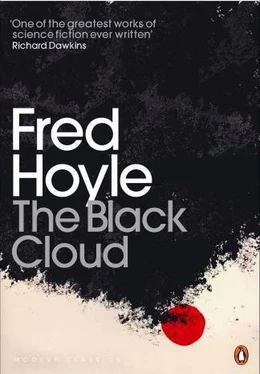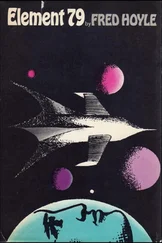Fred Hoyle - The Black Cloud
Здесь есть возможность читать онлайн «Fred Hoyle - The Black Cloud» весь текст электронной книги совершенно бесплатно (целиком полную версию без сокращений). В некоторых случаях можно слушать аудио, скачать через торрент в формате fb2 и присутствует краткое содержание. Жанр: Фантастика и фэнтези, на английском языке. Описание произведения, (предисловие) а так же отзывы посетителей доступны на портале библиотеки ЛибКат.
- Название:The Black Cloud
- Автор:
- Жанр:
- Год:неизвестен
- ISBN:нет данных
- Рейтинг книги:5 / 5. Голосов: 1
-
Избранное:Добавить в избранное
- Отзывы:
-
Ваша оценка:
- 100
- 1
- 2
- 3
- 4
- 5
The Black Cloud: краткое содержание, описание и аннотация
Предлагаем к чтению аннотацию, описание, краткое содержание или предисловие (зависит от того, что написал сам автор книги «The Black Cloud»). Если вы не нашли необходимую информацию о книге — напишите в комментариях, мы постараемся отыскать её.
The Black Cloud — читать онлайн бесплатно полную книгу (весь текст) целиком
Ниже представлен текст книги, разбитый по страницам. Система сохранения места последней прочитанной страницы, позволяет с удобством читать онлайн бесплатно книгу «The Black Cloud», без необходимости каждый раз заново искать на чём Вы остановились. Поставьте закладку, и сможете в любой момент перейти на страницу, на которой закончили чтение.
Интервал:
Закладка:
The death-ray theory gained further ground.
It was an odd commission. It came through Ann Halsey’s agent. Would she accept an engagement on 25 February to play two sonatas, one by Mozart, the other by Beethoven, at some place in Gloucestershire? The fee named was high, very high even for an able young pianist. There would also be a quartet. No other details were given, except that a car would be waiting at Bristol for the 2 p.m. Paddington train.
It wasn’t until Ann went along to the restaurant car for tea that she discovered the identity of the quartet, which turned out to be none other than Harry Hargreaves and his crowd.
“We’re doing some Schönberg,” said Harry. “Just to file their ear-drums down a bit. Who are they, by the way?”
“A country-house party, as far as I can gather.”
“Must be pretty wealthy, judging by the fees they’re willing to pay.”
The drive from Bristol to Nortonstowe passed very pleasantly. There was already a hint of an early spring. The chauffeur took them into the manor house, along corridors, opened a door. “The visitors from Bristol, sir!”
Kingsley had not been expecting anyone, but he recovered quickly. “Hello, Ann! Hello, Harry! How nice!”
“Nice to see you, Chris. But what is all this? How did you come to turn yourself into a country squire? Lord, more like, considering the magnificence of this place — rolling acres and that sort of thing.”
“Well, we’re on a special job for the Government. They apparently think we’re in need of some cultural uplift. Hence your presence,” explained Kingsley.
The evening was a great success, both the dinner and the concert, and it was with great regret that the musicians prepared to leave the following morning.
“Well, good-bye, Chris, and thanks for the pleasant stay,” said Ann.
“Your car ought to be waiting. It’s a pity that you should have to leave so soon.”
But there was neither chauffeur nor car waiting.
“No matter,” said Kingsley, “I’m sure that Dave Weichart will be willing to run you to Bristol in his own car, although it’ll be quite a squeeze with all those instruments.”
Yes, Dave Weichart would run them to Bristol, and it was quite a squeeze, but after about a quarter of an hour and much laughter they were under way.
Within half an hour the whole party was back again. The musicians were puzzled. Weichart was in a flaming rage. He marched the whole party into Kingsley’s office.
“What’s going on around here, Kingsley? When we got down to the guard’s place, he wouldn’t let us through the barrier. Said he had orders not to let anyone out.”
“We’ve all got engagements in London this evening,” said Ann, “and if we don’t get away soon we shall miss our train.”
“Well, if you can’t get out of the front gate, there are lots of other ways out,” answered Kingsley. “Let me make a few inquiries.”
He spent ten minutes at the phone while the others fretted and fumed. At length he put the receiver down.
“You’re not the only ones in a bit of a temper. People from the estate have been trying to get out into the village, and they’ve all been stopped. It appears as if there’s a guard around the whole perimeter. I think I’d better get on to London.”
Kingsley pressed a switch.
“Hello, is that the guard’s office at the front gate? Yes, yes, I accept that you are only acting under the Chief Constable’s orders. I understand that. What I want you to do is this. Listen carefully, I want you to ring Whitehall 9700. When you get that number you will give the code letters QUE and ask for Mr Francis Parkinson, Secretary to the Prime Minister. When Mr Parkinson comes on the line you will tell him that Professor Kingsley wishes to speak to him. Then you will put the call through to me. Please repeat these instructions.”
After a few minutes Parkinson came through. Kingsley began:
“Hello, Parkinson. I hear you sprang your trap this morning … No, no, I’m not complaining. I expected it. You may put as many guards as you please on the perimeter of Nortonstowe, but I will have none of them inside. I am ringing now to tell you that communication with Nortonstowe will henceforth be on a different basis. There are to be no more telephone calls. We intend cutting all wires leading to the guard posts. If you wish to communicate with us you must use the radio link … If you haven’t finished the transmitter yet, that’s your own affair. You shouldn’t insist on the Home Secretary doing all the wiring … You don’t understand? Then you ought to. If you chaps are competent enough to run this country at a time of crisis you ought to be competent enough to build a transmitter, especially when we’ve given you the design. There’s one other thing and I’d like you to take careful note of it. If you won’t allow anyone to go out, we shall allow nobody to come into Nortonstowe. Or on second thoughts you yourself, Parkinson, may come in if you please, but you will not be allowed out. That’s all.”
“But the whole thing’s preposterous,” said Weichart. “Why, it’s practically like being imprisoned. I didn’t know this could happen in England.”
“Anything can happen in England,” answered Kingsley, “only the reasons that are given may be somewhat unusual. If you want to keep a body of men and women imprisoned in a country estate somewhere in England, You don’t tell the guards that they are guarding a prison. You tell them that those inside need protection against desperate characters who are trying to break in from outside. Protection, not confinement, is the watchword here.”
And indeed the Chief Constable was under the impression that Nortonstowe held atomic secrets that would revolutionize the application of nuclear power to industry. He was also under the impression that foreign espionage would do its utmost to prise out these secrets. He knew that the most likely leak would be from someone actually working at Nortonstowe. It was therefore a simple deduction that the best form of security would be to prevent all access to, or egress from, the place. In this belief he had been confirmed by the Home Secretary himself. He was even willing to concede that it might be necessary to augment his police guard by calling in the military.
“But what has this, whatever it may mean, to do with us?’ asked Ann Halsey.
“It’d be easy for me to pretend that you happened to be here by accident,” said Kingsley, “but I don’t think so. You’re here as part of a plan. There are others here as well. You see George Fisher, the artist, was commissioned by the Government to do some drawings of Nortonstowe. Then there’s John McNeil, a young physician, and Bill Price, the historian, working on the old library. I think we’d better try to rope ’em all in, and then I’ll explain as best I can.”
When Fisher, McNeil, and Price had been added to their company, Kingsley gave the assembled non-scientists a general but fairly detailed account of the discovery of the Black Cloud, and of the events that had led up to the establishment of Nortonstowe.
“I can see why this explains the guards and so forth. But it doesn’t explain why we’re here. You said it wasn’t an accident. Why us and not someone else?’ asked Ann Halsey.
“My fault,” answered Kingsley. “What I believe to have happened is this. An address book of mine was found by Government agents. In that book were the names of scientists that I consulted about the Black Cloud. What I presume to have happened is that when some of my contacts were discovered, the Government decided to take no chances. They simply roped in everybody in the address book. I’m sorry.”
“That was damned careless of you, Chris,” exclaimed Fisher.
Читать дальшеИнтервал:
Закладка:
Похожие книги на «The Black Cloud»
Представляем Вашему вниманию похожие книги на «The Black Cloud» списком для выбора. Мы отобрали схожую по названию и смыслу литературу в надежде предоставить читателям больше вариантов отыскать новые, интересные, ещё непрочитанные произведения.
Обсуждение, отзывы о книге «The Black Cloud» и просто собственные мнения читателей. Оставьте ваши комментарии, напишите, что Вы думаете о произведении, его смысле или главных героях. Укажите что конкретно понравилось, а что нет, и почему Вы так считаете.












